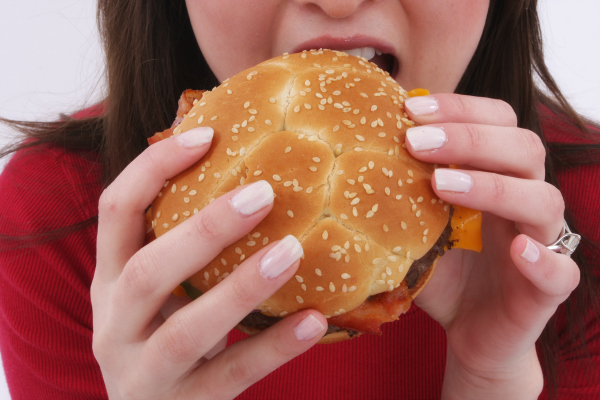Body Image, Binge Eating, and Sexual Dysfunction in Women

Poor body image esteem and binge-eating tendencies in women are linked to sexual distress and dysfunction, according to new research in the Journal of Sexual Medicine.
Body esteem and dissociation during sex are particularly linked, the researchers found.
It’s not uncommon for women with eating disorders to experience sexual problems, such as low desire, poor arousal, vaginismus, or trouble with orgasm.
In fact, some of the same factors that contribute to eating disorders also impact sexual function. One is body esteem. A woman may feel that she is not thin enough, undergo a strict diet, then eat excessively (binge eating). The guilt and shame she feels may prompt her to vomit or exercise vigorously.
Similarly, if she feels that she is not thin enough, she may worry that her partner will find her unattractive, leading to sexual anxiety. She may become so preoccupied with her body image that she cannot enjoy the encounter with her partner. In severe cases, she might dissociate, becoming so distracted and detached from the experience that sexual issues persist.
To learn more about these concepts and how they might work together, researchers created a two-hour experiment that measured levels of cortisol – a stress hormone involved with “fight or flight” response – in women watching a sexually arousing video.
Sixty women between the ages of 25 and 35 participated in the study. All the women were heterosexual and had a regular partner. They completed several questionnaires designed to evaluate dissociative tendencies, sexual distress, body esteem, and feelings about food and eating.
Twenty percent of the women were frequent binge eaters; another 35% said they binge ate sporadically. The rest were not binge eaters.
The women were asked to view a short video that began with neutral content but switched to sexual scenes that, in past studies, were deemed to stimulate female sexual arousal.
Using saliva samples, the scientists measured cortisol levels in each woman before the video, during the sexual portion of the video, and again about an hour after the video.
After analyzing the samples and reviewing the questionnaires, researchers found that women with poor body esteem who also showed a tendency toward binge eating were more likely to feel sexual distress. They also found a link between body esteem and dissociation during sex; women who dissociated and had poor body image had higher cortisol levels, indicating higher levels of stress.
“[Whttps://www.betterhealth.vic.gov.au/health/conditionsandtreatments/dissociation-and-dissociative-disorders" style="margin: 0px; padding: 0px; border: 0px; font-style: inherit; font-variant: inherit; font-weight: bold; font-stretch: inherit; font-size: inherit; line-height: inherit; font-family: inherit; vertical-align: baseline; color: rgb(145, 188, 64); text-decoration: none;">https://www.betterhealth.vic.gov.au/health/conditionsandtreatments/dissociation-and-dissociative-disorders
The Journal of Sexual Medicine
Castellini, Giovanni, MD, PhD, et al.
“Body Esteem as a Common Factor of a Tendency Toward Binge Eating and Sexual Dissatisfaction Among Women: The Role of Dissociation and Stress Response During Sex”
(Full-text. Published online: June 27, 2017)
http://www.jsm.jsexmed.org/article/S1743-6095(17)31267-5/fulltext
Psychology Today
Bergland, Christopher
“Cortisol: Why ‘The Stress Hormone’ Is Public Enemy No. 1”
(January 22, 2013)
https://www.psychologytoday.com/blog/the-athletes-way/201301/cortisol-why-the-stress-hormone-is-public-enemy-no-1
You may also be interested in...
Other Popular Articles

What Is the Average Penis Size?
If you have ever wondered how your penis compares to others in terms of size, you are not alone. Many men are curious to know how their penises stack up compared to the average. Unfortunately, general curiosity can sometimes give way to full-on obsession and anxiety about penis size. This can be an unhealthy and often unnecessary fixation, especially because most men who think their penises are too small have perfectly normal-sized penises.

What Is Jelqing, and Does It Actually Work?
The term “jelqing” refers to a set of penis stretching exercises that some believe can make the penis bigger. Although the practice has gained attention and popularity in blogs and internet forums in recent years, there is no scientific evidence that it is an effective way to permanently increase the size of one’s penis. In fact, in some cases, jelqing may actually cause damage to the penis, so it is a good idea to get all the facts before setting off to try it.

What Is Sensate Focus and How Does It Work?
Sensate focus is a technique used to improve intimacy and communication between partners around sex, reduce sexual performance anxiety, and shift away from ingrained, goal-oriented sexual patterns that may not be serving a couple.

Can Sex Reduce Menstrual Cramps?
The SMSNA periodically receives and publishes ‘guest editorials.’ The current article was submitted by Mia Barnes, a freelance writer and researcher who specializes in women's health, wellness, and healthy living. She is the Founder and Editor-in-Chief of Body+Mind Magazine.
Having sex while you experience menstrual cramps is healthy and can provide significant benefits. While it might not be the first activity that comes to mind when your PMS or period cramping begins, many people enjoy sex to reduce menstrual cramps, experience increased pleasure and benefit from other advantages. Learn more about having sex while menstrual cramps are happening and how it can help your body.

How Long Does It Take the Average Man to Ejaculate?
On average, it takes a man between 5 to 7 minutes to orgasm and ejaculate during sexual intercourse.

Can Sex Throw off Your Vaginal pH Balance?
The SMSNA periodically receives and publishes ‘guest editorials.’ The current article was submitted by Mia Barnes, a freelance writer and researcher who specializes in women's health, wellness, and healthy living. She is the Founder and Editor-in-Chief of Body+Mind Magazine.
Your vagina is a pretty powerful organ. It is a pathway for menstrual blood and babies. It also is a main player in sexual intercourse. You might hear about your vagina’s pH and worry that yours is at risk. Here’s what to know about vaginal pH, including the impacts sex could have.
You are prohibited from using or uploading content you accessed through this website into external applications, bots, software, or websites, including those using artificial intelligence technologies and infrastructure, including deep learning, machine learning and large language models and generative AI.

